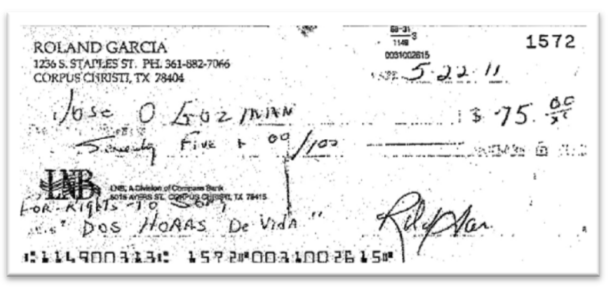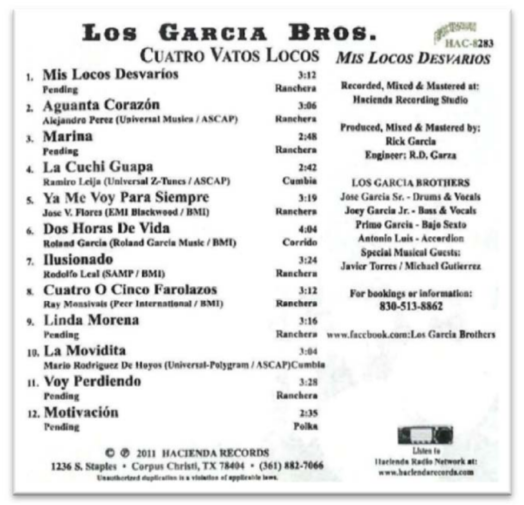I previously asked whether the below check transferred copyright ownership:
 It doesn’t, at least not on a motion for summary judgment.
It doesn’t, at least not on a motion for summary judgment.
If you can’t read it, on the memo line the check says “For rights to song ‘Dos Horas De Vida.” The check was written by defendant Hacienda Records to Jose Guzman, the songwriter of “Dos Horas de Vida.’ ” Guzman doesn’t read English and thought the check was reimbursement for his travel to the studio.
A check can transfer ownership, but it won’t always: “Review of the case law leads this Court to conclude that there is no disagreement with the general proposition that language on a check may transfer a copyright; as with most legal issues, different facts lead to different results.” The court then reviews many different cases involving transfer of rights via a check and finds that it is not a question suitable for disposition on summary judgment:
Looking at the check in this case on its own without extrinsic evidence (as Hacienda’s summary judgment motion presents the issue), the Court concludes that this case has more in common with the cases rejecting assignment. Most notably, the only cases finding an assignment as a matter of law at summary judgment did so when separate contracts made that assignment clear. Even Rico, the case quoted above for the general proposition that language on a check may amount to a transfer, looked at extrinsic evidence to interpret the intent of the endorsement language in the context of the parties’ course of dealings. The Rico court did so because the check endorsements “Purchase of rights of EGC catalogue” and “Bonus on L.P. recording agreement” were “not sufficiently clear as to unambiguously evidence copyright transfer, [though] they are susceptible to such an interpretation.” The separate contracts in Johnson and Dean provided answers to important questions that the “for rights to song” language in this case does not answer: Did the parties intend a right to license or an outright assignment of the copyright? And for how long? To the lyrics and/or the music?
Because the four words on the check do not evince a copyright transfer with the clarity that section 204(a) requires, Hacienda is not entitled to summary judgment on this issue. Extrinsic evidence that demonstrates the parties’ intentions may help resolve this issue at trial.
And a bonus issue: The court also held that Guzman stated a claim for violation of the DMCA by falsely identifying the president of Hacienda, Garcia, as the author of the song on the album:
 It appears that the DMCA offers a back door into a moral rights attribution claim, at least if the wrong name is given (versus no name at all). The court cites to the famous Haiti earthquake case of Agence France Press v. Morel, 769 F. Supp.2d 295, 304-06 (S.D.N.Y. 2011) for the proposition. Here, the relevance of the name in the album credits is ambiguous and so the claim survives.
It appears that the DMCA offers a back door into a moral rights attribution claim, at least if the wrong name is given (versus no name at all). The court cites to the famous Haiti earthquake case of Agence France Press v. Morel, 769 F. Supp.2d 295, 304-06 (S.D.N.Y. 2011) for the proposition. Here, the relevance of the name in the album credits is ambiguous and so the claim survives.
Guzman v. Hacienda Records, L.P., No. 6:13-Cv-41 (S.D. Tex. Feb. 24, 2015

The text of this work is licensed under a Creative Commons Attribution-No Derivative Works 3.0 United States License.

Leave a Reply